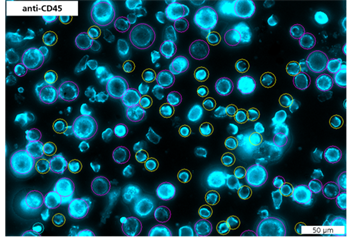
Airway neutrophilia is a cellular response associated with inflammatory processes in lung diseases such as acute lung injury, severe asthma, and chronic obstructive pulmonary disease (COPD). The activation of these effector cells plays a pivotal role in driving inflammation. Current methodologies do not allow assessment of activation status at the single-cell level; however, chip cytometry — a combination of antibody staining and microscopy — allows for the detection of neutrophil activation on a single-cell basis.
RLS-0071, a novel dual-targeting anti-inflammatory peptide, has shown potential to reduce airway neutrophilia in a human endotoxin challenge model using LPS inhalation. Researchers at Fraunhofer ITEM used chip cytometry on samples of induced sputum to evaluate the effects of RLS-0071 treatment on neutrophil granulocyte counts, activation marker expression, and the intracellular effector molecules myeloperoxidase (MPO) and neutrophil elastase (NE).
The established automated evaluation facilitated an in-depth analysis of the neutrophil population. The data confirmed significantly decreased neutrophil counts and reduced activation in induced sputum following RLS-0071 treatment. In addition, reduced MPO and NE concentrations in the sputum supernatant correlated with decreased intracellular staining of MPO and NE in neutrophils after treatment with RLS-0071.
 Fraunhofer Institute for Toxicology and Experimental Medicine
Fraunhofer Institute for Toxicology and Experimental Medicine